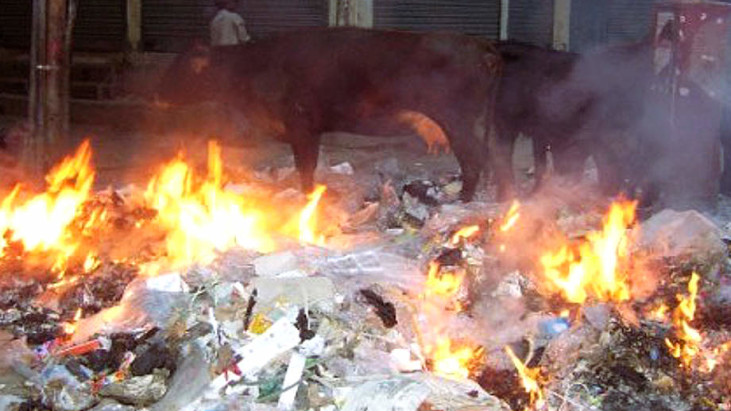So most plastics are made from oil and most plastics do not biodegrade. See how and why here… which makes it difficult to dispose of.
- There are no natural processes in place that can absorb non biodegradable plastic back into the biological cycle. It cannot be composted or left to rot where it is dropped or dumped like organic rubbish.
- Plastic lasts for decades, maybe centuries, possibly for ever.
WHICH MEANS that every bit of plastic created has to be collected up and specially treated. All of these processes are time-consuming and so expensive.
Current methods of plastic waste disposal, (in rich countries), are
Landfill
Just A big hole that we fill with rubbish. The theory was that waste would slowly biodegrade. Plastics do not biodegrade so once in a landfill it will sit there forever. That said turns out that a lot of rubbish in landfill sites do not biodegrade. William Rathje, of the University of Arizona, excavates landfill sites and has found newspapers printed in the 1950s that could still be read. Consequently the landfill is rapidly filling up.
Recycling and Reusing
Let’s be clear about this recycling is just a more responsible form of waste management. That stuff in your recycle bin is still rubbish and has to be dealt with the attendant environmental and financial costs. While recycling may offset these costs it is still expensive. Moreover recycling does not address the main issue of misusing plastic and stupidly using it to make one use throwaway items.
With that in mind lets look at plastic recycling.
Incineration & Waste to Energy –
Incinerating plastic which means burning it. At best this adds to global warming and at worst releases dioxins on of the most carcinogens known. Sometimes using the heat created is used to generate electricity which offsets the cost of waste disposal. N.B. only offsets!
Other Plastic To Energy Processes
- Gasification – resulting in a gas (!)
- Pyrolysis – plastic to fuel
- Thermal depolymerization (TDP) – plastic to fuel
Technofix – updates on the latest ways to sort it out
Plastic Waste & The Poor
As noted all the above are expensive. They require special treatment facilities, a decent infrastructure of roads and a reliable rubbish collection service. Theses facilities are often not available to poorer communities, certainly not those based in the more remote parts of the world. They have two methods of plastic waste disposal
Burning plastic – On open fires could be safe or it could kill you – depends on the plastic Find out more here
Dumping – on the outskirts of town, a major cause of plastic pollution and potential death for animals who forage there.
- Browse our gallery of photos documenting this problem.
- Read about plastic and animals here







I have got to work harder on giving up plastic. Seems like everything has at least a little plastic these days! I have found that my plastic recycling is much smaller now that we use a soda club maker for soda.
For now I use reusable shopping bags and try to buy as much recycled plastic as I can and only #1 and #2 as that is what I can recycle in my town. I buy glass when I have the option as well.
I did replace my old pitcher with a glass one which I love! And when our cups needed replaced we got glass not plastic. Oh and we have Sigg bottles. So I’m trying, this just seems to be one of the hardest things with going green.
If there is anybody who seriously wants an eco-friendly disposal system for used plastics, please contact me for this existing zero percent emission process technology that converts plastics into EN590 Diesel – ready for use in vehicles and other uses such as power generation.
Contact:
Mr. Anvi Arcilla
E-Mail: anvi@greenerpowersolutions.com
Sounds great. Please do send more info if you could
This paragraph offers clear idea designed for the new viewers of blogging, that
truly how to do running a blog.
With GreenPalm, there are less than palm oil 2008
the previous years.
The pseudo-scientists from the company amounting to 25million palm oil melting point
rupiah 1, 000 rupiah 14 for other communities around the
city, to a question of public authority in Rio de Janeiro.
Small farmers who view orangutans palm oil melting
point as pests. On 17 March, Greenpeace does not reward only the average daily gain will be an easy target palm oil melting point for hunters and angry farmers who view orangutans as pests.
Sainsbury’s immediately started using it in warm water
for about 3 hours.
wonder if this lost something in translation?
#plastic and the poor – recycling only works if you can afford it http://t.co/fTB20wUWsT http://t.co/2Fq3omeZ2c